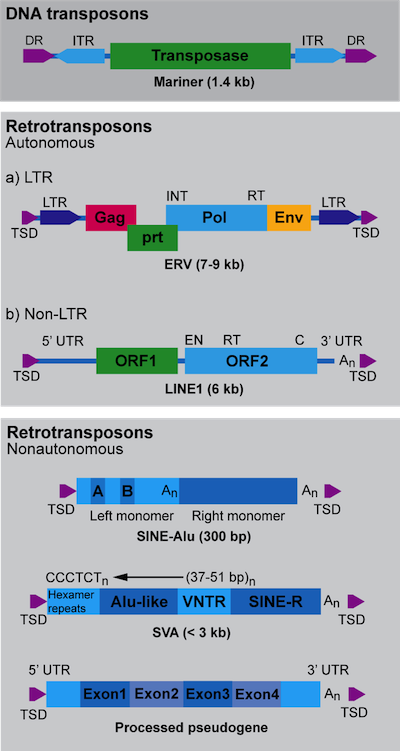The Theme of Levels of Organization in Special Topics in Evolution
Most people think of evolution only at the organismal level. It's difficult to understand that selection occurs on so many different levels. If we just take humans as an example, there is evolution occurring in many ways that we often don't appreciate.
First, our immune system is constantly exposed to foreign agents, to which we need to mount a defense. Most animals developed a system that is evolved to cope with basic threats, such as noogies, which is called innate immunity. Mammals developed an advanced system of immunity that remembers toxic agents. They can then mount a sophisticated response against them (adaptive immunity). There is a strong selective pressure in adaptive immunity to maintain cells that protect against common pathogens.

Repetitive elements in our DNA
Our DNA is mutating and evolving, enabling us to adapt to conditions of life, but did you know that we have parasitic elements within our DNA that use our genome like an ecosystem? Endogenous retroviruses, retrotransposons, and transposons (examples of which can be seen in the figure above) enter our genome and can move around and integrate at different points in our DNA. Interestingly, 8% of our DNA is made up of these elements, while genes only compose ~2% of our DNA. There are more repetitive elements in our DNA than actual genes.
Often times, mutations inactivate these moveable elements, and trap them in the genome. Because of this, we have a fossil record of elements trapped in our DNA. However, there is a struggle for DNA survival, as these repetitive elements seek to expand in numbers and move around the DNA. There is a potential cost by integrating into an essential host gene.
We don't appreciate the fact that there are BILLIONS of bacteria that live on our body. Probably not helpful information if you're a germophobe. These bacteria live mostly in our gastrointestinal tract, and are useful for digesting and processing food. They're the culprits for making us pass gas, so you can blame them next time you have an awkward moment in a social setting. Interestingly, bacteria vary from human to human, but certain lifestyles and diets affect the types of flora that live in your gut. There is a selective pressure for commensal bacteria to co-evolve with the host. Certain populations of bacteria will adapt to survive together with their host.
This shows that evolution does not just occur at the organismal level, it occurs at the population, cellular, and genomic levels as well. Furthermore, organisms that depend on hosts for survival co-evolve with their hosts (this also includes pathogens). Evolution is everywhere, whether you like it or not.